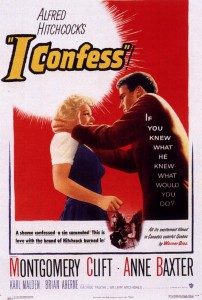 The Hitchcock Conversations is an ongoing project between me and James W. Powell, in which we study Alfred Hitchcock’s filmography in chronological order. I’ll be publishing one conversation per week.
The Hitchcock Conversations is an ongoing project between me and James W. Powell, in which we study Alfred Hitchcock’s filmography in chronological order. I’ll be publishing one conversation per week.
(By necessity, spoilers ahead!)
Synopsis: Otto Kellar and his wife Alma work as caretaker and housekeeper at a Catholic church in Quebec. While robbing the house where he sometimes works as a gardener, Otto is caught and kills the owner. Consumed by guilt, he heads back to the church where Father Michael Logan is working late. Otto confesses to his crime, but when the police begin to suspect Father Logan, he can’t reveal what he has been told in confession.
Jason: So here we have I Confess, a film that’s much better than I thought it would be. For me, this is yet another pleasant Hitch surprise, a lesser-known work that impresses in the same vein as Stage Fright and Foreign Correspondent. It’s a dark, shadowy, serious film and obviously very personal for Hitch, considering his Jesuit upbringing.
James: I too found I Confess to be a pleasant surprise. I had no expectations going in, and although I wasn’t as blown away as I was with Stage Fright, I enjoyed this one on many levels.
Jason: The most interesting aspect of the film is its central idea—that a priest is forbidden to reveal what he hears during ritual confession, even if it’s a confession of murder. Such a confession starts this film, between Father Michael Logan (Montgomery Clift) and rectory handyman Otto Keller (O. E. Hasse)—escalating into a tense and mean-spirited struggle by the end, all in the face of Logan’s steadfast refusal to betray that vow of confidence. From the start, we know Keller (“killer”) is responsible for the murder, and I found it extremely interesting the way Logan’s silence, when questioned by the police, makes him increasingly the prime suspect in the crime.
James: Nice catch on the “killer” vs. Keller. I hadn’t noticed that.
Jason: Hey, thanks.
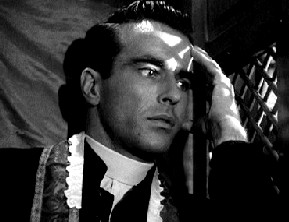 James: But yeah, one of the great aspects of this film is the driving force of the story—a priest who sticks to his vows and refuses to implicate a murderer. What a wonderful idea. It gets even better when you realize that everyone begins to think the priest himself has committed the crime, just because of his silence. Or at least that he’s corrupt in some way because of secrets in his past involving his old lover, Ruth Grandfort (Anne Baxter). In reality, the priest does absolutely nothing wrong throughout this film, but the public and the police believe him to be guilty of a number of different things.
James: But yeah, one of the great aspects of this film is the driving force of the story—a priest who sticks to his vows and refuses to implicate a murderer. What a wonderful idea. It gets even better when you realize that everyone begins to think the priest himself has committed the crime, just because of his silence. Or at least that he’s corrupt in some way because of secrets in his past involving his old lover, Ruth Grandfort (Anne Baxter). In reality, the priest does absolutely nothing wrong throughout this film, but the public and the police believe him to be guilty of a number of different things.
Jason: We should probably dig more into this central idea before going into the other elements. It definitely worked for me, but it left me with questions. I’m not fluent in Catholicism, but the movie’s portrayal of the priest’s adherence to his vow seemed accurate to me. That being said, do you really think a priest would doggedly stick to that vow if the man who confessed the murder gradually began attempting to implicate the priest? Is the vow unbreakable in any situation? Is that realistic?
James: The only part of the central idea that didn’t work for me is Logan’s inability to just say, “The killer confessed to me, but I won’t tell you who he is.” I mean, why not? Maybe Catholicism doesn’t allow even that? I’m not sure. Sure, it would have been much less cinematic. But it seems that he could have turned to someone for support. Then again, Christ had no support carrying the cross, so maybe Catholic priests take on the same burden. But the way this vow is portrayed in the film is what creates the tension. It works. And it’s tough to watch in a lot of scenes. Here’s a man accused of murder, and he knows the truth all along. That’s a powerful story.
Jason: One of the interesting aspects of the vow of confession, in this case, is that after the confession, the priest can never allude to what he has heard—even to the confessor. So Logan is even more stymied by his predicament. All he can do is go faithfully forward into his fate and trust that God will take care of him, which is what ultimately happens, from a certain point of view.
James: Interesting that Hitchcock’s Jesuit advisor felt that Logan’s simple glance toward the murderer while on the stand could be considered a break of his vow. They’re pretty damned strict, those Catholics.
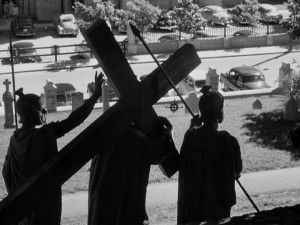 Jason: One of the things that speaks to Logan’s integrity is the fact that he’s almost always seen walking in this film. He exudes an air of total dignity, striding forward through town, through the rectory, onto the next test of faith. This visual motif parallels the use of the “Direction” signs at the very beginning of the film. There’s even a shot of Logan walking along a Quebec street while in the immediate foreground, in shadowed silhouette, we see a huge statue of Christ bearing the cross.
Jason: One of the things that speaks to Logan’s integrity is the fact that he’s almost always seen walking in this film. He exudes an air of total dignity, striding forward through town, through the rectory, onto the next test of faith. This visual motif parallels the use of the “Direction” signs at the very beginning of the film. There’s even a shot of Logan walking along a Quebec street while in the immediate foreground, in shadowed silhouette, we see a huge statue of Christ bearing the cross.
James: How does a man walking translate into integrity? I mean, I see what you’re getting at, but I’m not sure I understand exactly.
Jason: I think the many scenes of Logan walking are symbolic of the relentless forward motion of his integrity. He never backs down, he’s constant. No hesitation. In a couple situations, when things look bleak for him, he just calmly gets up and begins walking, walking, walking—patient and faithful. I don’t know if that answers your question, but I can see the symbolism clearly. Do you think it’s a reach? I know you’re skeptical of symbolism as a rule.
James: I’m not sure I buy that the walking scenes are a symbol of Logan’s integrity, but I certainly see your point. His character is always in motion, and that’s a trait that develops his character.
Jason: There’s another element here: We come to find that Keller has murdered the one man whom Logan himself would murder, if given the chance. Do you think Logan begins to accept the guilt of the murder because he’s relieved to see Villette (Ovila Legare) dead?
James: How can you say that Logan would have murdered Villette if given the chance? I don’t see that in his character at all. Sure, he shoved Villette years earlier, during a compromising scenario, but even that seemed to be justified. I don’t believe there’s any guilt in Logan’s mind. Hell, he didn’t even want to answer questions that he felt would implicate Ruth and get her in trouble. He certainly knows how to keep a secret, and it seems he does so for the right (unselfish) reasons.
Jason: What I meant was this: Villette is the one man in all of Quebec whom Logan wouldn’t mind seeing “out of the way.” Villette is blackmailing Logan and Ruth, so he’s a thorn in Logan’s side. Villette knows the couple had a romantic relationship years ago, before Logan was a priest and before Logan knew that Ruth was married. In particular, he knows Logan and Ruth got it on in his backyard during a rainstorm. I’m just saying that Logan probably felt murderous thoughts about Villette and therefore feels some measure of guilt when Villette is actually murdered. Is there a little bit of martyrdom to this story?
James: Wait a second, I didn’t think Ruth and Logan actually slept together. I watched the film and believed exactly what was stated and shown. I mean, maybe you’re right and they had sex, at least that one time in the storm. But for me, that’s not how it happened. He just protected her from the storm and didn’t see her again until the night of the murder. In that light, he’s more innocent, but that’s the way I saw it. And it works better that way for me.
Jason: As I watched that flashback sequence, in which Logan and Ruth find themselves in that little backyard gazebo, I knew they were up to no good. It’s all filmed in a very chaste way, and in Ruth’s mind, I’m sure the memory has a chaste romanticism to it, but the looks in their eyes completely suggest sex. Come on, man, read between the lines.
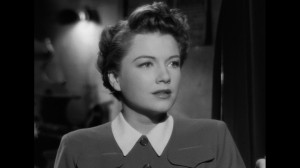 James: Yeah, I guess they could’ve done the naughty, but I think I wanted them to be innocent of that. I wanted the story to be about them being dragged through the mud even though they didn’t deserve it. So I guess that clouded my judgment. Well, that and the fact that it was never stated per se.
James: Yeah, I guess they could’ve done the naughty, but I think I wanted them to be innocent of that. I wanted the story to be about them being dragged through the mud even though they didn’t deserve it. So I guess that clouded my judgment. Well, that and the fact that it was never stated per se.
Jason: I guess I just felt like I was following the film’s shorthand, its subtle sexual cues (the only way to give the impression of sex in the days of the Production Code censors). I liked the idea of a sexual relationship before Logan’s entrance into the priesthood. I don’t think that idea compromises their innocence. In fact, it strengthens their emotional relationship, their history, and their fear.
James: Okay. But going back to your question, I’d have to watch this film again before I make the leap that Logan accepts the guilt of the murder. I’m still not even sure Logan wanted Villette dead. Yes, Villette’s death would help the woman Logan cares for, but I think he’d much rather have talked to Villette about the problem. As for Logan being a martyr, in the strict sense of the word, he definitely is. He’s risking death in the name of his faith.
Jason: Speaking of martyrdom, in the play, Logan is convicted and hanged. The Production Code wouldn’t allow that for the film.
James: Logan hanged would’ve been a major bummer of an ending. Damn!
Jason: Is it too much of a coincidence that Keller’s victim happens to be Villette? It’s just a robbery gone wrong, right? The victim could have been anyone, and yet it happens to be the one man intricately involved with the priest to whom Keller immediately goes for confession . . .
James: Well, that’s just good storytelling. I mean, if the victim were anyone else, we wouldn’t have a good story.
Jason: Okay, but would it have worked better had Keller known about the blackmail and targeted Villette with the foreknowledge of implicating the priest? That would have made him more villainous.
James: I don’t think a villainous Keller would have worked. Part of what works for the film is that Keller at first appears to be a character in the wrong place at the wrong time. He made a mistake. If it was too intentional, it wouldn’t work that the priest would stay true to his vow.
Jason: The most interesting character in this film, for me, is the killer’s wife, Alma Keller (Dolly Haas). Not only is there the personal element of giving her the same name as Hitch’s wife, but she also ends up being the film’s hero. She reminds me of the farmer’s wife, Margaret (Peggy Ashcroft), in The 39 Steps, all suffering and faithful, quiet and modestly beautiful.
James: Alma definitely reminded me of the farmer’s wife in The 39 Steps. Very similar. The only drawback to Alma is that I knew she was going to save the day for Logan. But it’s amazing how well Hitch set up that character with so little dialog. I got to know her pretty well and yet she says almost nothing.
Jason: You knew Alma was going to save the day? I was hoping she’d be the hero of the story, but I had my doubts. Considering the instant comparison with the farmer’s wife, who ends up sadly receding back into her unhappy life, I wasn’t sure what to expect from Hitch. I practically cheered when Alma broke away from her husband to come to Logan’s rescue.
James: You could just see it in Alma’s eyes. At first, she’s wary of the priests. She thinks Logan might spill the beans. Then, later, you can see that she thinks her husband is doing the wrong thing, especially when he reveals the gun. I was surprised she waited so long to break free of him. I was expecting her to shout in the courtroom after a guilty verdict.
Jason: I also half-expected an outburst in the courtroom, perhaps reminiscent of Jill Lawrence (Edna Best) calling out at the opera in The Man Who Knew Too Much. I, too, expected a guilty verdict, especially following that weird little glimpse into the jury chambers, where it looks like opinion is going against Logan. But the more Alma remained silent throughout the film, the more I thought she wouldn’t speak out and would end up as some kind of tragic figure. So I saw her character going in two potential directions: heroism or tragedy.
James: Interesting.
Jason: Alma has a great scene early in the film, in which she’s walking behind the seated priests at the rectory dinner table, watching Logan, knowing what he knows and wondering whether he’s going to say anything to implicate her husband in Villette’s murder. The camera is watching her, and the conversation between the priests is just about boring church business. And yet there’s high tension in this scene, all unspoken, all in her expression. The essential part of the scene is what isn’t said. Brilliant.
James: Her silence during the dinner scene is wonderful. Hitch always has great dinner scenes, but as you said, this one really builds the Alma character without her ever saying a word. Very tense.
Jason: He does like his scenes involving food.
James: Another aspect of this film I really liked is the theme of confession. People are confessing all through this film: first Keller, then Ruth, then the people on the stands in the courtroom. Plus, the priest keeps secrets throughout.
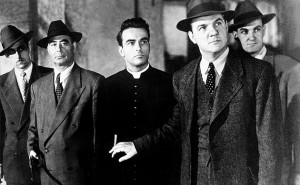 Jason: That’s a good catch, and I didn’t see it on first viewing. Not only does the film begin with Keller confessing to Logan (in private, in a dark confessional), it also ends with Keller confessing to Logan and the public (on a bright stage, in front of everyone). So the structure is once again balanced. In between those two confessions, you also have confessions from Keller to his wife Alma, from Ruth to her husband Pierre Grandfort (Roger Dann), from Ruth to Inspector Larrue (Karl Malden), from Alma to Logan, and others.
Jason: That’s a good catch, and I didn’t see it on first viewing. Not only does the film begin with Keller confessing to Logan (in private, in a dark confessional), it also ends with Keller confessing to Logan and the public (on a bright stage, in front of everyone). So the structure is once again balanced. In between those two confessions, you also have confessions from Keller to his wife Alma, from Ruth to her husband Pierre Grandfort (Roger Dann), from Ruth to Inspector Larrue (Karl Malden), from Alma to Logan, and others.
James: This film also has some decent mystery at its center. I mean, I wasn’t sure how innocent Logan actually was, for example.
Jason: Yes, Logan’s innocence is a mystery throughout, and it’s handled extremely carefully. Because of the way Montgomery Clift plays him—detached, inner, even-keeled—you’re left wondering what he’s really about. In the end, you see that he’s blameless in both the murder and the relationship with Ruth, and yet you can’t help feeling that people have died because of his silence and steadfastness. Would Alma have died were it not for his refusal to point out the real killer immediately?
James: I wonder if it’s more important for a man of the cloth to uphold church doctrine than to save lives. It seems that way here, doesn’t it? You’re right, Alma dies because Logan holds on to the truth. Of course, he couldn’t have known what might happen in the end.
Jason: I read that in the original play—Paul Anthelme’s Nos Deux Consciences (“Our Two Consciences”)—there was an illegitimate child involved, so the priest carried more actual guilt. But in this film, Logan is pure, except perhaps in his thoughts. The illegitimate child was nixed by the Production Code. Once again.
James: If an illegitimate child had been involved, I would’ve felt differently about Logan. I wanted him to be cleaner. More virtuous. Of course, if a child had been in the picture, the drama would have been much more powerful for Ruth and her husband, Pierre. I just think the story would’ve felt different. Not wrong, necessarily, just different. But, in the film, I certainly suspected—at first—that Logan was sleeping with Ruth. Hitchcock really plays with us on this idea.
Jason: Yes, when we first meet Ruth, as she’s reacting to the news of Villette’s murder, she says to Logan, “I can’t believe it! We’re free!” At that moment, I was sure she was sleeping with Logan. The truth, it turns out, is much more interesting.
James: I didn’t really like the ending. It seemed just a bit too convenient. I mean, Keller doesn’t come across as a bad man in this film, especially at the beginning. Even the murder seems to be little more than an accident. Yet at the end, he becomes evil, shooting his wife, a cook, and then at the police. I liked the wife’s actions, but Keller’s seemed a bit off.
Jason: I agree that the ending is a bit convenient, but I admit to getting caught up in it. When Keller pulls the gun and shoots his wife, who is on the verge of implicating him, I felt shock. Mostly because I really cared for the Alma character. I really felt her emotion.
James: What did you think of the leading lady, Anne Baxter?
Jason: I thought Anne Baxter was serviceable. She’s no knockout Hitch blonde, but in some scenes she looked prettier than in others.
James: I didn’t think so much of her.
Jason: The most fascinating aspect of the Ruth character is the way she has completely fantasized her memory of Logan. In her confession flashback, in which she explains her past relationship with Logan before the war and his priesthood, she remembers their fling with ultra-romanticism, complete with slow motion and idyllic situations. Everything is gushy and wonderful. So, Hitchcock’s completely subjective viewpoint in this romance dream says a lot about Ruth, making her seem kinda nutty. Ruth becomes much more interesting in that light. I laughed when she comes twirling down the stairs in slow motion, and everything is so mushy and earnest.
James: Oh yes, I thought the romantic flashback was hilarious and very well done. I immediately took it as her perceptions of the events, not necessarily what really happened. I think it’s interesting that Truffaut calls it a “false flashback” . . . and in a way, it is. It speaks volumes about the Ruth character.
Jason: Why did Ruth get married, anyway, if she was so smitten with Logan? Hmmmm.
James: What a bitch! Why did she marry? Interesting.
Jason: Do you think Ruth secretly wishes Logan were guilty of the murder, which would confirm his love for her? I think it’s interesting that when she learns the true identity of the murderer, she just turns away and says, “Take me home, Pierre.”
James: Hmm, I was wondering about Ruth’s line at the end. That makes some amount of sense. So, are you basically saying that she’s done with Logan? He truly has given his love to God over her, so she’s going to just walk away?
Jason: Yeah.
James: I like it.
Jason: Now, we have to talk about Montgomery Clift. I thought he was amazing in this film. Absolutely amazing.
James: Definitely. I can’t imagine a better actor for the part.
Jason: He was one of the first “method actors,” in the same generation as Marlon Brando and James Dean. He internalizes Logan’s conflict so well and is able to project the priest’s soul from his eyes in an incredible way.
James: Clift was very impressive with his moody, always-thinking persona. He’s a tragic story, too. I gather he was involved in a bad accident and his face was disfigured. Then he died pretty young, if I’ve done the math right.
Jason: Oh yeah, in the DVD documentary, Peter Bogdonavich casually mentions “Clift’s accident.” A little research shows that it was a car accident in 1956, just a few years after he made this film. Apparently, it was after a party at Elizabeth Taylor’s house, and she saved him from choking to death on his own teeth, but his face was disfigured. He acted a little more, but he died 10 years later (drug-related). He was 46.
James: A shame.
Jason: One of the things that struck me most is how dark and shadowy I Confess is. It’s incredibly moody, filled with haunting imagery that recalls German filmmaking, film noir, and even religious iconography. It reminded me of the mood of Sabotage, which also started with a crime just committed and the perpetrator walking away from the scene. I Confess is somber and without much humor, but I don’t think those qualities are a detriment. And looky here, Hitch has done some real location shooting. No process shots here, it’s all Quebec. And it really adds to the mood of the film. I like how Hitch used these visually stunning images to express the states of the characters’ souls.
James: Wonderful cinematography. The location shooting really helped this film, no question about that.
Jason: I have never seen so many stairs in a Hitchcock film. They are all over the place, from the view up to Hitch’s cameo in the first shot, to the stairwell leading up the rectory where Logan is stationed, to the many stairwells of the city, to the courthouse stairwell, down which the publicly “doomed” Logan walks after his trial.
James: I actually didn’t even register the stairs. I usually notice every single stairwell, but in this film, I glossed right over them. In retrospect, though, I can see that they have the deep meaning we’re accustomed to.
Jason: They add up to an ever-present sense of doom throughout the film.
James: In the first interrogation scene at the crime scene, I thought Keller gave himself away by saying he knew it was a murder. The detective’s expression in response even seems to indicate that. But alas, it was not to be.
Jason: I didn’t catch Keller’s slip. That’s interesting. Speaking of Larrue, how about that Karl Malden? I assume you recognized him. He’d won an Oscar for A Streetcar Named Desire, and he became famous later as Detective Mike Stone on the TV show The Streets of San Francisco. I thought the Larrue role was a nice foreshadow of that long-running series. The excellent thing about Larrue is that finally we have a smart cop! Hitch is known for his buffoon policeman, but this one is quick and clever.
James: I liked Larrue. He’s the strongest detective yet in Hitchcock’s films. Well acted. Did you find his character to be evil in a way? Was he twisting the evidence to suit his needs, or was he simply trying to get the information he needed?
Jason: I didn’t think Larrue had an ulterior motive. I thought he was just as single-minded and determined as Logan. In a way, the two characters parallel each other in their integrity. I admired the scenes in which Hitch makes it clear that the priest and the detective are working from completely separate points of view, and yet they balance each other.
James: Good point.
Jason: What did you think of the crown prosecutor, Willy Robertson (Brian Aherne)? The first two times we meet him, he’s balancing forks over a glass and balancing a glass of liquor on his forehead at a drunken party. There’s a comment there about the scales of justice, but is there more to it?
James: I thought the prosecutor was odd, but now that you point out the balancing acts, that makes sense, too. But I’m not sure what Hitch is saying. Maybe that the balance of justice isn’t so structured as we might believe it should be?
Jason: Something about the frivolity of justice. Something about justice being a joke.
James: You’re making all sorts of sense.
Jason: We haven’t even mentioned that I Confess is one of Hitch’s most powerful “wrong man” stories yet!
James: I’m not sure if this is the most powerful “wrong man” movie, but it certainly is the most serious. Perhaps the darkest, most thought provoking. The serious nature of this film is a different take for Hitchcock, but it works. What’s interesting in that regard is that Logan isn’t trying to get his way out of his predicament like the heroes in other Hitch films.
Jason: Did you notice the birds (seagulls) hovering over the ferry as Logan meets with Ruth (watched by detectives)? I haven’t seen that particular symbolism in a number of films, so it’s nice to see it return.
James: I didn’t notice the birds. Hmmmmm . . .
Jason: Hitch always said he didn’t want to make “pictures of people talking.” I Confess is more like “pictures of people thinking.” So much of this story is happening inside these characters. That may be what I admire most about this film.
James: “Pictures of people thinking.” I love that. And it’s so true. So often, we see people thinking in these movies, and it’s obvious what’s going on inside. Hitch was a master at that.
Jason: Amen.
James: You know, while doing some reading about this film, I was totally surprised to find that Hitch said I Confess should never have been made simply because some audience members didn’t know the rules of the Catholic church and thus might find it hard to believe that Logan would hold true to his vow. Watching the film, I didn’t know the details of the confession in any detail, but I still really enjoyed the film.
Jason: That was a surprising revelation. And even Hitch makes it sound like a failure of the film rather than a failure of the audience. I would say, instead, that the film was maybe ahead of its time or at least brave for portraying something that the audience had little knowledge about.





